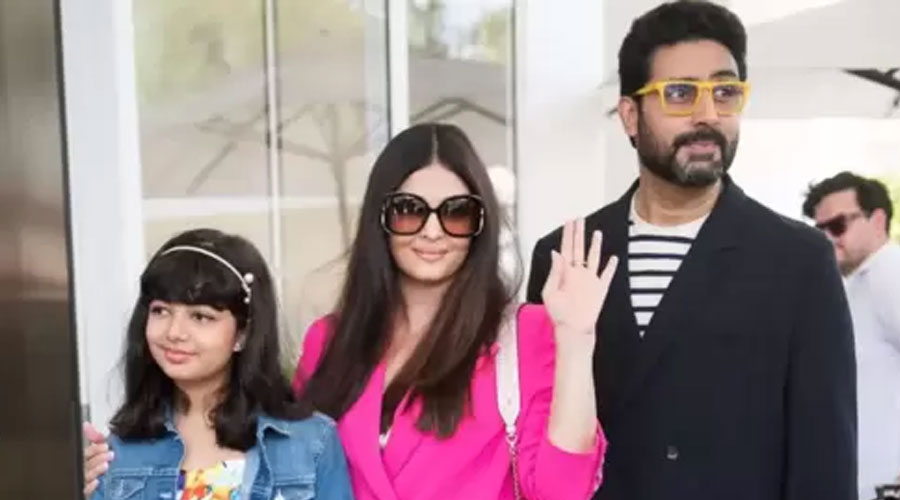The Delhi High Court on Thursday restrained several YouTube channels from publishing misleading content on the health of Aaradhya Bachchan, daughter of actors Abhishek Bachchan and Aishwarya Rai Bachchan, saying spreading misinformation about a child reflects "morbid perversity".
The court, while dealing with a lawsuit by the minor child and her father, directed Google to take down from its platform certain videos which claimed that Aaradhya Bachchan was "critically ill" and "no more".
Justice C Hari Shankar said every child is entitled to be treated with honour and respect and dissemination of misleading information in respect of a child's health was "completely intolerable in law".
The judge emphasised that Google was making money from the activities on YouTube and, therefore, besides ensuring compliance with the law, it also has a social responsibility to ensure such content is not shared on its platform.
"Although this is not the first time that such misinformation is being circulated for celebrities, when information relates to a child of tender age, it reflects morbid perversity on part of the persons circulating the video in complete apathy to the interest of the child," said the court as it stopped the uploaders from further publishing similar content with respect to the minor girl's health.
"Every child is entitled to be treated with honour and respect, be it the child of a celebrity or a common person. Circulating misinformation as regards physical and mental health of a child is something that is completely intolerable in law," it said.
The court, in the interim order, asked Google to disclose the details of the uploaders, including email and IP addresses, and clarified that similar videos, whenever brought to Google's notice by the plaintiff, shall also be taken down.
"You have responsibility to see proper dissemination. You are providing platform on which misinformation is being provided to public. How can such a thing be tolerated?" the court told counsel for Google.
"YouTube does not run for charity. It is a profit making platform. If you are making money. You have a social responsibility. You can't allow your platform to run such kind of videos," it said.
Senior advocate Dayan Krishnan argued videos were available on YouTube making "fake claims" in relation to the 11-year-old child in violation of the intermediary rules as well as the right to privacy and intellectual property rights.
The plaintiffs, also represented by lawyers Pravin Anand and Ameet Naik, contended Google cannot be a "tacit onlooker" when rules cast a duty on intermediaries to undertake due diligence and make reasonable efforts to prevent invasion of privacy and content harmful to child.
Counsel for Google lawyer Mamta Jha said while it cannot actively monitor all the content being shared on its YouTube platform, there is a mechanism in place to take steps against videos that are contrary to its policy. Jha said despite being a neutral platform, Google has a "zero tolerance policy" for certain content such as child pornography.
Justice Shankar disapproved of the circulation of misinformation about Aaradhya Bachchan on the platform, remarking that Google was duty-bound to follow the legal framework for intermediaries on dissemination and regulation of information.
The court asked Google to file a response stating in detail its policy on dealing with such objectionable content in view of intermediary rules and amendments and said it will examine if the policy is sufficient to ensure compliance with the rules.
As an intermediary, you have a duty to amend your policy in terms of the rules and its amendments, it added. The court issued summons on the lawsuit to the YouTube channels, including "Bollywood Time", "Bolly Pakora", "Bolly Samosa", "Bollywood Shine" and others, saying a prima facie case was made out for grant of interim relief to prevent further prejudice.
"Defendants 1 to 9 (YouTube channels) are completely restrained from publishing, sharing and disseminating any content on any public platform across the net relating the state of health or physical condition of the plaintiff," ordered the court.
"Defendant no 10 will immediately delist and deactivate all videos (mentioned in the plea). On the plaintiff bringing to notice any other video uploaded on YouTube dealing with physical health and wellbeing of the plaintiff, defendant no 10 shall proceed to take down the said URL," added the court.
It also directed the Centre to block access to the content in question and said technicalities cannot stop it from granting relief.
Counsel for Google urged the court to grant it 36 hours, as provided for in the IT Act, to remove the videos as its team was stationed in the US.
The plaintiffs have alleged there were certain "absolutely false" videos on YouTube about Aaradhya Bachchan's health and private life and they portrayed in "bad light" the Bachchan family name which itself is "protectable as a trademark" and "epitomizes highest of virtues".
The videos violated the minor's privacy and the sole purpose behind the "distasteful content" was to "create shock value, gain overnight popularity" and profit, it said.
The matter will be heard next in July.
Except for the headline, this story has not been edited by The Telegraph Online staff and has been published from a syndicated feed.










